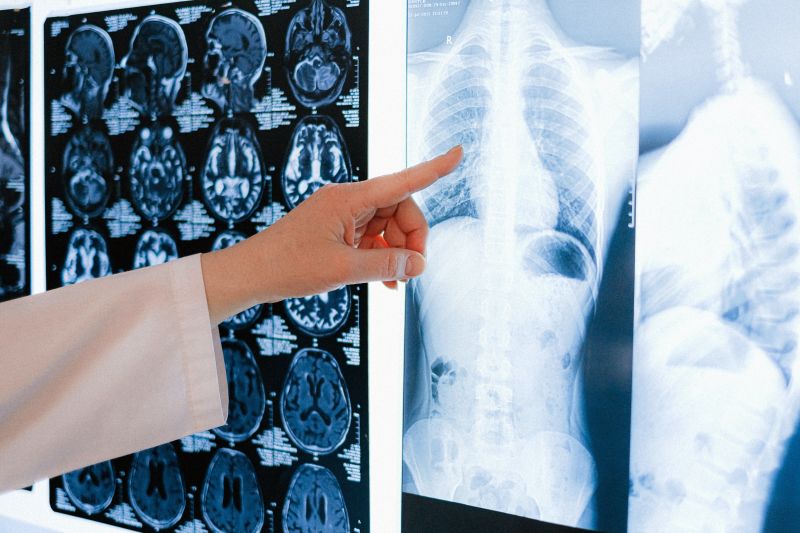Jakarta (ANTARA) – COVID-19 is a disease that mainly attacks the respiratory tract. To avoid this, health protocols such as wearing masks and vaccinating must be implemented.
If a person is already infected, how does it affect the respiratory system?
Pulmonary and respiratory specialist, dr. Amira Anwar, Sp.P, FAPSR, from the Indonesian Doctors Association explained that COVID-19 infection can cause mild, moderate, or severe symptoms.
The main clinical symptoms of COVID-19 include fever, shortness of breath, weakness, muscle aches, and diarrhea. Each patient may have different symptoms. In severe cases, there can also be a rapid worsening, causing respiratory failure, other metabolic disorders, disorders of the coagulation system (blood clotting), to the occurrence of cytokine storms that can damage organs in the body.
Treatment therapy for COVID-19 patients is adjusted to the symptoms and results of the patient’s own examination. In mild symptoms, patients can be given vitamins and drugs according to symptoms. Meanwhile, for moderate and severe symptoms, the patient will be given antiviral drugs and other drugs according to the results of the physical examination, laboratory, and other supporting examinations by the doctor.
The SARS-CoV2 virus that causes COVID-19 can attack both lungs, when oxygen saturation drops dramatically due to severe inflammation. In this condition, the lungs will be filled with a lot of fluid, phlegm, and cells.
This causes damage to the walls of the air sacs of the lungs, causing the patient to become short of breath and develop severe pneumonia or pneumonia acute respiratory distress syndrome (ARDS). Patients with this condition require a breathing apparatus using a ventilator due to respiratory failure.
In ordinary cases of pneumonia, most people recover without any lasting lung damage. This is in contrast to pneumonia caused by COVID-19, which can progress to severe pneumonia.
“Even after the illness has passed, lung injuries from COVID-19 can cause breathing difficulties that may take months to improve,” Amira said, quoted from an official statement on Wednesday.
Lung health in post-COVID-19 patients
Because it primarily attacks the lungs, COVID-19 often causes scarring or damage to the lungs. This lung injury then causes post-COVID-19 patients to experience symptoms or respiratory problems (pneumonia) that persist for 4-12 weeks after being infected with COVID-19. Even in some patients, chronic post-COVID-19 symptoms can also occur for more than 12 weeks.
In addition to treating people who are infected, currently health workers are also facing post-COVID-19 symptoms. Not only for someone who previously had severe symptoms, these post-COVID-19 symptoms are also experienced by a lot of people who at the time of infection only had mild symptoms, even without any symptoms.
Post-COVID-19 symptoms include cough with phlegm/dry, shortness of breath, limited activity, fatigue, headache, muscle and joint pain, changes in taste and smell, mood changes, chest pain, sore throat, and abnormalities in examination results. laboratory and radiology. The symptoms most complained of were coughing and loss of the sense of taste and smell about 32 percent.
To establish a diagnosis of post-COVID-19 symptoms or “long covid“Covid-19 survivors are advised to consult a doctor and carry out several examinations such as repeat PCR tests, blood tests, radiology, cardiac records, and pulmonary function tests. This examination is useful to help establish a diagnosis, to treat post-COVID-19 symptoms which is still felt.
Amira described three actors that influence the risk of lung damage in post-COVID-19 patients. First, the severity of the disease. Did the patient experience mild, moderate, or severe symptoms when infected with COVID-19. Patients with mild symptoms are less likely to have long-lasting injuries/scars in the lung tissue
Second, health conditions. Does the patient have comorbid diseases such as chronic obstructive pulmonary disease (COPD) or heart disease that may increase the risk of the disease getting worse. Older people are also more susceptible to severe cases of COVID-19. This is related to lung tissue that has experienced aging (degenerative) so that the condition is more inflexible when compared to lung tissue in someone who is younger.
Third, treatment measures. The patient’s recovery and long-term lung health will depend on what type of treatment they receive, and how quickly treatment is administered. In patients with severe symptoms, proper treatment while in hospital can minimize lung damage.
“There are 6 groups that are susceptible to post COVID-19 syndrome, namely female sex, age over 50 years, having more than five symptoms when infected, white ethnicity, having comorbidities, and obesity,” he said.
Usually, patients with post-COVID-19 respiratory syndrome are given two types of therapy, namely pharmacological therapy through drugs given according to symptoms to reduce cough and shortness of breath, as well as vitamins. The second therapy is non-pharmacological such as pulmonary rehabilitation, oxygen therapy, psychotherapy, exercise according to ability and nutrition.
“Therefore, patients are strongly advised to consult a doctor and carry out evaluations one, three, and six months after being declared cured of COVID-19,” he said.
Tips to minimize lung damage
There are several things you can do to reduce the risk of lung damage. First, avoid the possibility of being exposed to the virus by implementing 5M, namely maintaining hand hygiene, wearing masks, maintaining distance, staying away from crowds, and reducing mobility. Especially if you have a comorbid disease. A person with comorbidities should as much as possible manage their health problems as well as possible. Keep blood sugar levels under control, take medication regularly if you have heart problems, and so on.
Second, live a healthy lifestyle with the right diet and adequate water consumption. Continue to consume a balanced nutritious diet to maintain a healthy body and overall immunity. Proper hydration can maintain healthy blood volume and mucous membranes in the respiratory system. This can help the body fight infection and tissue damage better.
Also, avoid smoking, e-cigarettes, or exposure to secondhand smoke and air pollution. Do the COVID-19 vaccination and complete it with a booster vaccine to further strengthen immunity.
COVID-19 causes more abnormalities in the lungs. In fact, the symptoms felt can persist in the post-COVID-19 period. The virus that causes COVID-19 can also cause damage to other organs, namely the heart, kidneys, nervous system, and blood disorders. Recovery may not be short.
“Therefore, consultation after being infected with COVID-19 is very necessary, especially for patients who have comorbidities, so that COVID-19 survivors can fully recover and carry out their activities again as before.”
–


